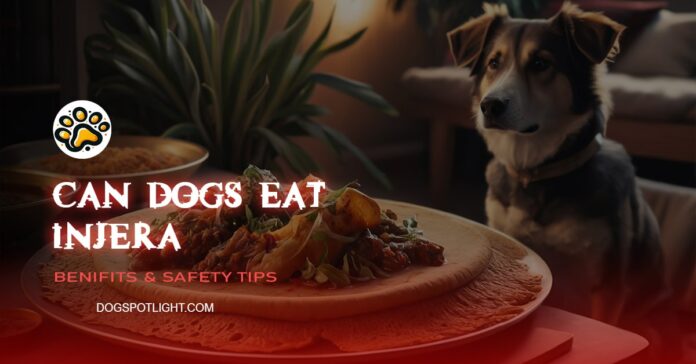Ever wondered if your furry friend can share in your love for Ethiopian cuisine? Specifically, can dogs eat injera? This traditional Ethiopian flatbread has gained popularity worldwide, but before sharing it with your four-legged companion, let’s dive into what you need to know.
What is Injera?
Injera is a sourdough-risen flatbread with a unique spongy texture, traditionally made from teff flour. It’s a staple in Ethiopian cuisine and serves as both a food and utensil during meals While humans love this tangy bread, we need to consider its safety for our canine friends
The Quick Answer
Can dogs eat injera? Yes, dogs can technically eat injera in small amounts, but it’s not recommended as a regular treat While not toxic, this Ethiopian bread offers little nutritional value for your furry friend and could cause some digestive issues
Safety Considerations When Feeding Injera to Dogs
1. Ingredients Matter
The basic ingredients in injera include – Teff flour- Water- Salt- Yeast (for fermentation)
Most of these ingredients aren’t harmful to dogs, but there are some concerns to keep in mind.
2. Potential Risks
- Fermentation: The fermentation process creates a slightly acidic bread that might upset your dog’s tummy
- Salt Content: Too much sodium isn’t good for dogs
- Gluten Sensitivity: Some dogs may be sensitive to gluten in certain types of injera
- Empty Calories: Like most bread products, injera doesn’t provide meaningful nutrition for dogs
Better Alternatives for Your Dog
Instead of feeding your pup injera, consider these healthier options that you can find more about on Pet like boss:
- Fresh vegetables
- Lean meats
- Dog-specific treats
- Natural chews
For more comprehensive information about safe foods for dogs, check out our dog nutrition guide.
When to Be Concerned
If your dog has eaten injera and shows these symptoms:- Vomiting- Diarrhea- Lethargy- Excessive thirst
Contact your vet immediately.
The Cultural Context
While injera is a beloved food in Ethiopian culture, our furry friends don’t need to participate in this culinary tradition. Dogs have different nutritional needs than humans, and what’s healthy for us isn’t always suitable for them.
Tips for Dog Owners
- Always introduce new foods gradually
- Monitor your dog after trying new foods
- Keep portions small when testing food tolerance
- Consult with your vet before making dietary changes
Frequently Asked Questions
Q: What happens if my dog eats a large amount of injera?
A: While not typically dangerous, large amounts could cause digestive upset or bloating.
Q: Is teff flour toxic to dogs?
A: No, teff flour isn’t toxic to dogs, but it’s not particularly beneficial either.
Q: Can injera cause allergic reactions in dogs?
A: While rare, some dogs might be sensitive to the ingredients in injera.
Making Safe Food Choices
Remember that just because a food is safe for human consumption doesn’t automatically make it appropriate for dogs. When in doubt, stick to foods specifically formulated for canine nutrition.
The Bottom Line
While dogs can eat injera without immediate danger, it’s not an ideal treat for your furry friend. Instead of sharing this Ethiopian bread, focus on providing your dog with nutritionally appropriate foods and treats designed for their specific needs.
Final Thoughts
Being a responsible pet owner means making informed decisions about what we feed our four-legged friends. While it might be tempting to share everything we eat with our dogs, some human foods are best kept for human consumption only. Injera falls into this category – while not harmful in small amounts, it’s simply not worth the potential risks and lack of nutritional benefits.
Remember, every dog is unique, and what works for one might not work for another. When in doubt, always consult with your veterinarian about your dog’s specific dietary needs. And if you’re looking for more information about pet care and nutrition, don’t forget to check out our comprehensive guides at Pet like boss.
Keep your pup healthy and happy by making informed choices about their diet, and save the injera for yourself! After all, there are plenty of other ways to show your dog some love that don’t involve sharing your Ethiopian feast.
Note: This article is meant for informational purposes only and should not replace professional veterinary advice. Always consult with your veterinarian before making changes to your dog’s diet.











